Farmer John Writes: Great People
Harvest Week 20, Deliveries of October 31st – November 4th, 2023
It’s The End of the Season for Some
This week, Week 20, is the last week of deliveries of our main season. After this week, we still have four weeks of the extended season for those who are signed up for an extended season share.
Haidy and I are not so keen on the name Extended Season and will probably change it to Holiday Season. Extended seems like over-extending one’s stay, or one’s credit card, or one’s tax payment. Holiday Season—now that’s more like what it is.
Check the delivery calendar in your membership account if you are unsure about your deliveries for the rest of the season.
The Weather
Last weekend, the weather turned from pleasant to cold, freezing cold, below-freezing cold. This posed a dilemma, because many of our crops that are still in the field can stand below-freezing cold, but not way-below-freezing cold—low 20’s, maybe even the upper teens. The crops vulnerable to that much cold could be kale, chard, celeriac, cabbage, and broccoli—probably not parsley, not sure. Probably not Brussels sprouts, depending on what web page I land on to investigate frost tolerance. About lettuce—it will not survive that much cold. If covered and the cover touches the lettuce leaves, those leaf tips will freeze and blacken. So we harvested a lot of lettuce last Friday. It will store well, especially the Romaine, of which we have a lot.
Of course, it’s not so hard to manage this freezing weather, if we are just managing harvest for the last full week of the season; we could just bring it all in a bit early. But, we have an additional 4 weeks of extended (holiday) season to anticipate. (That’s a little more than half as many boxes per week as we deliver during the regular season.) Many crops are already in storage, of course, such as onions, garlic, potatoes, squash and carrots..also Daikon. But what about the crops that sweeten with some frost or die with too much frost, such as kale, chard, broccoli and cabbage…even Brussels sprouts if pushed too far into the frost?
The forecast depth of frost is a mystery, of course, because it won’t kill these crops I just named unless it’s a really hard frost, but it’s impossible to know how low the temperatures will go and for how long those temperatures will stay that low. If we tried to bring all these crops in…uh, I don’t think we have the bins, the help, and the cooler space, but we did expand the harvest before the cold hit by late Saturday afternoon.
Complicating these decisions—there is a gigantic amonout of conflicting information about vegetables on the internet; it’s a bit like reading or watching the news.
Please Ponder
At what point in time does the crop belong to the shareholder? Does it ever belong to me? When I fret over a crop, such as above, mindful that a certain level of frost will sweeten it and an extreme amount of frost will ruin it, is it mine if it is ruined and the shareholder’s if it is saved? I have brought this up in Farm News before, but I find myself examining it again, as there is so much at stake with the crops still in the field in light of the upcoming frost.
When I offer you crops in the customization email, I only offer crops that are there. I don’t offer crops that froze and that are not there. However, the frozen ungivable crop is part of the CSA share. We know that in the transactional model offered through CSAware, the only crops that can be offered are the ones that are available, not the ones that failed. How many shareholders would choose to receive a phantom, ungiveable, non-existent crop that their money paid to grow? I’m not trying to be cute here; I’m just examining the CSAware model that we use vs the concept or philosophy of CSA.
To take this a little further, it’s ironic that that the farm will give a credit for a substandard item, such as a bad melon. The money for the CSA share grew that bad melon; the shareholder’s money grew the bad melon. Again, not trying to be cute or cagey here—it’s just something to think about.
Customer Service
Emails pour in daily from shareholders. I am having trouble keeping up, as I am also managing harvests and navigating upcoming frosts. The surge will eventually subside. We plan to be better staffed next year to manage the large volume of emails that come to the farm.
One shareholder suggested that I spend less time on Farm News and more on customer service—interesting suggestion. It reminded me of a shareholder who a while back said to only write about the crops and that my stories were unwelcome. Then there was the shareholder who said he liked the newsletters even more than the boxes of vegetables.
The Crops
Most of the crops are too beautiful to sacrifice to the frost. However, due to labor, time, and storage constraints, we had to do some triage. Hoping the chard can survive the cold; it probably will. We couldn’t harvest and store all of the kale—it will likely survive. Most kale information on the web says it will hold down to 15 degrees; some web info says only to 24 degrees. We decided to leave the kale in the fields to sweeten along with other crops that will sweeten with frost (or die with too much frost). There’s so much conflicting information.
The beets were too small to bother harvesting, and their leaves were speckled. I know a lot of shareholders love our beets—sorry. We got them planted later than we should have and they didn’t really size up. Maybe they will still grow a bit, probably not.
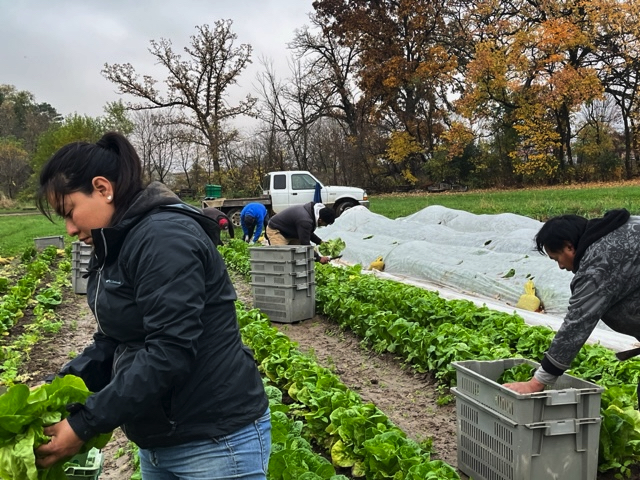
Concepcion and Bartolo (foreground) save lettuce from the hard frost
Lettuce—lovely, grew fast in the former warmth.
Arugula—not pristine, but fine enough for late October. The crew was taking out the bad leaves, but I had them be less fussy, because we were running out of time for being ready for the pack.
Cilantro Substitution—Parsley—we harvested the cilantro days early, due to weather concerns. It held up poorly in the cooler, so we discarded it all and are substituting with parsley. Cilantro and parsley have in common that they are both herbs, otherwise they are not that similar.
Carrots—long, orange and aromatic.
Garlic—legendary.
Popcorn—should be dry enough to pop. If not, fold the husk back and dry for a few days. The ear is longer than the husk on many—a little unsightly, maybe. We cut off the some of the barren, damaged tips.
Brussels sprouts—we endeavored to strip the black outer leaves on some of the sprouts last week, took way too long. It would have cost over $1,000 in labor to clean them all, so that job is for you, our helpful shareholder. Some stalks have very few black leaves, anyway. These are some of the biggest sprouts we have ever grown.
Kohlrabi—final harvest this week.
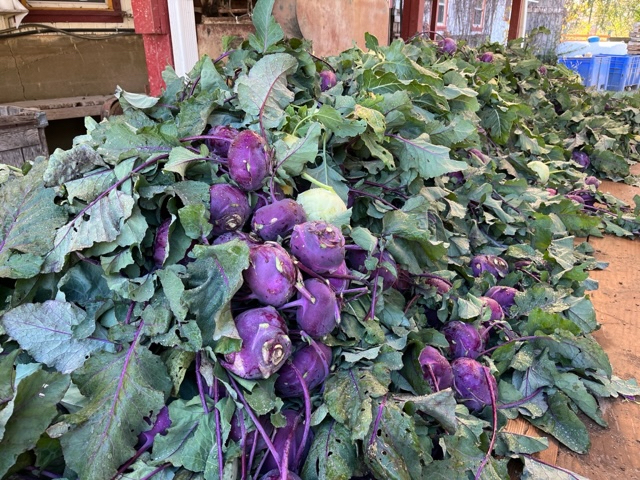
glorious kohlrabi
Daikon radish—might require a little excavating and shaving, but then, yum. (Hopefully, we will have enough. Might run short this week, in which case we will probably substitute with onions.)
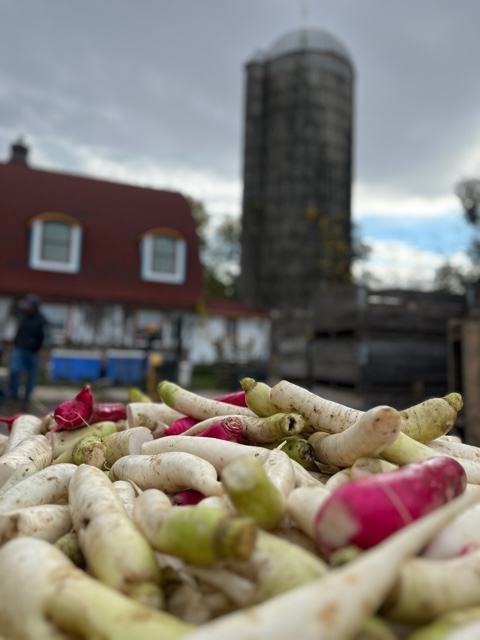
Daikon colors
Celeriac—brought in a final trailerload from the field on Saturday.
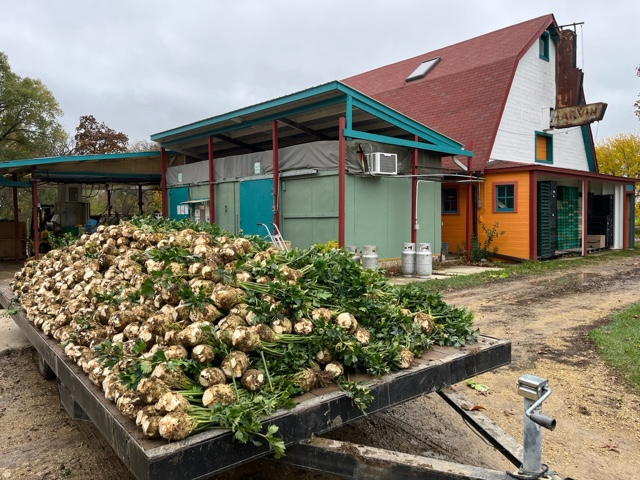
Is this a lot of celeriac? Probably for some…
The Crew
The crew generously agreed to work all day last Saturday, even though, before the frost scare, I had offered them all of Saturday off. Sometimes they get to laughing and have a hard time stopping—me, too.
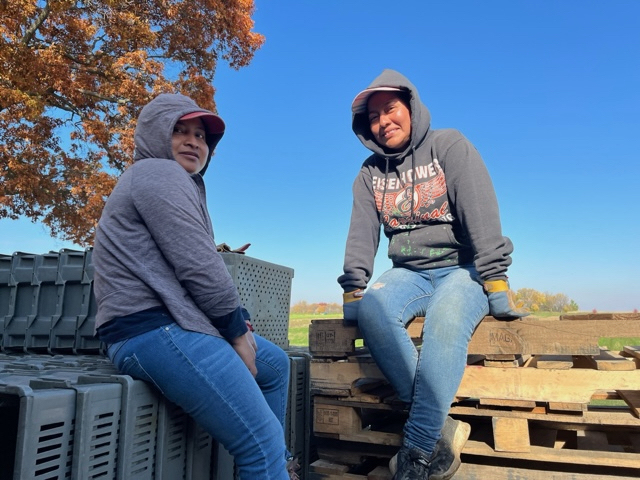
fun friends, Maythe and Concepcion—their 3rd year back on the farm
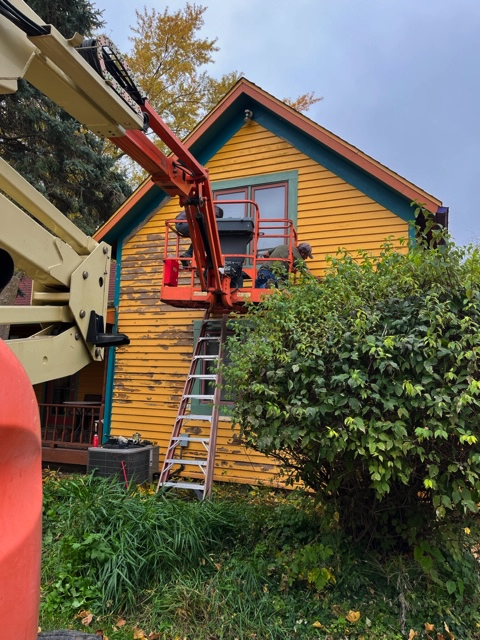
Ruben and Pollo restore the peeling Spanish colonial colors on the farmhouse
Our H-2A Workers
I interviewed seven of our eight H-2A workers for the first issue of Farm News this season, A Murder, a Baby and a Ghost.
I am now adding the interview with Bonifacio who joined us during the season, and further below, I am including photos of Maythe’s family farm in Mexico.
Bonifacio (Boni for short)
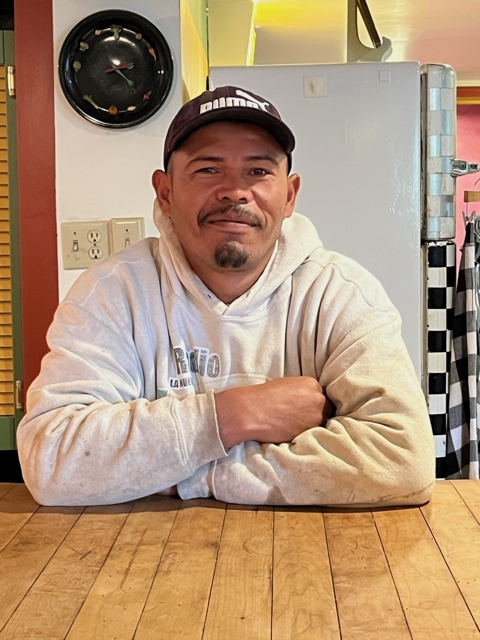
To remind you, Boni is the one who said early one morning, when I asked him why he was so happy, “God gave me the choice to be happy or sad. So I decide to be happy.”
(The following interview was translated by our bilingual whiz, Mayra.)
Farmer John: Is this your first time in the USA?
Bonifacio: Yes.
Farmer John: What jobs have you done?
Bonifiacio: I have worked with corn using tractors.
Farmer John: Where?
Bonifacio: In Zinapecuaro, Michoacan.
Farmer John: Tell us about your family.
Bonifacio: My family has been always in agriculture. We are 12 brothers and sisters. Some are in the USA. I never wanted to come to the USA illegally, so this program was my chance to come legally. My brother works in Mexico and grows vegetables.
Farmer John: You have a wife and kids?
Bonifacio: Yes, Maria del Carmen is my wife. Cristopher has 15 years, Angel 17 years, and Estrella 19 years. They are stepsons and a daughter.
Farmer John: What was your early life like?
Bonifacio: My childhood was kind of hard. My parents were poor. It was hard to feed all of us. I started working in the fields irrigating. I went to school but had to drop out in fourth grade. My parents didn’t have enough money to buy uniforms.
Farmer John: How do you like it here in the United States?
Bonifacio: I like to be here, because we have more opportunities than in Mexico.
Farmer John: How much do you make in Mexico?
Bonifacio: I make like 1200 pesos a week. It’s like 60 dollars a week.
Farmer John: How many days a week?
Bonifacio: 6 days a week.
Farmer John: That’s ten dollars a day. Any surprises here in the United States?
Bonifacio: With the work I do here, I feel like I went back in time. Here we don’t have chemicals.
Boni harvests organic cilantro
Farmer John: What are you going to do with your money from here?
Bonifacio: It’s for my kids for school. I don’t want them to have the same past that I had.
Farmer John: Are you going to see your brothers in the Northwest?
Bonifacio: I would like to see them if it won’t cause any problems.
Farmer John: I don’t think it would be any problem.
Bonificio: Its been 20 years since I have seen them.
Farmer John: Do you connect with them on Zoom?
Bonifacio: Only with one.
Farmer John: I hope you make the visit happen.
Bonifacio: Thank you.
Farmer John: Is there anything you want to add?
Bonifacio: One thing–I like to learn different things. My dad is a person that would get only one job. I like to do different stuff in the fields–mechanical stuff, irrigating, all sorts of things.
Farmer John: When you are back in Mexico, what are you going to do?
Bonifacio: I made an agreement with my past boss that when I get back, I would work 30 or 40 acres, only corn. My job down there is to clean out the channels and do the irrigating. In April I will seed the corn. We use a machine to seed corn. I started working with my dad at 7 years old with a horse. We had to harvest by hand.
Farmer John: My mother picked a lot of corn by hand, too.
Bonifacio: Thank you for giving me the opportunity to be here. I am really thankful about it. I am glad I met all of my group.
Farmer John: Thank for your good work. You have a great personality.
Bonifacio: Thank you so much for everything.
Maythe
Maythe is a most delightful addition to our farm team—hard working, fun, willing…
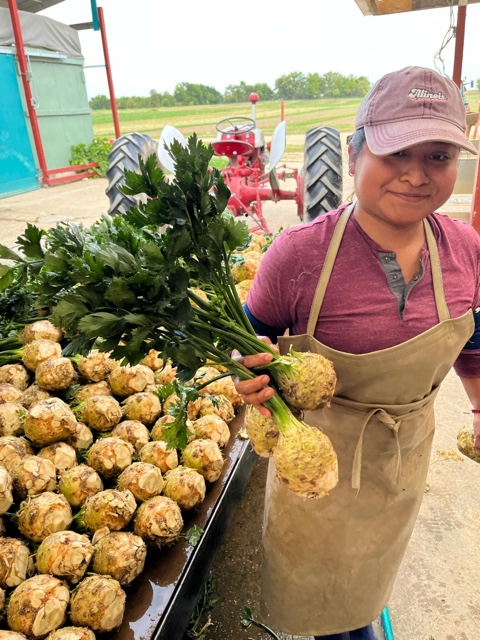
Maythe and celeriac before the frost
Refresher from Maythe’s interview in Week 1 Farm News:
“My mom doesn’t speak Spanish. She speaks Chinanteco, a native language. I am more familiar with Chinanteco. I dream in my language. There are only a few people that speak Spanish in my town.
My town is like a different world; everything is different. There are 2,000 people in the town and everyone knows each other. Its name is Cerro Armadillo Grande Oaxaca.”
Photos from Maythe
Below are some photos from Maythe’s family farm in Oaxaca, Mexico, which were not included with Maythe’s original interview in Farm News, Week 1. Maythe will return to her farm for the winter.
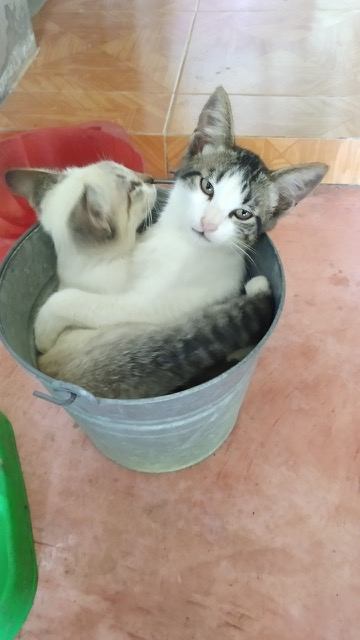
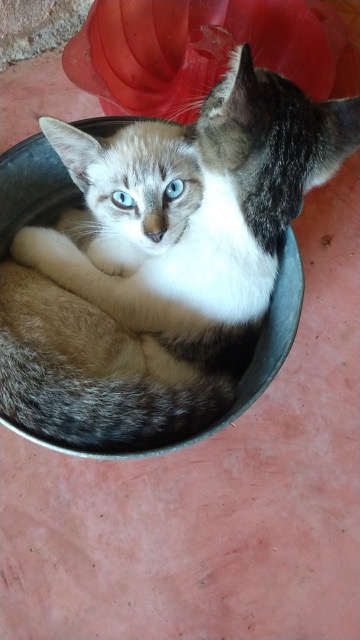
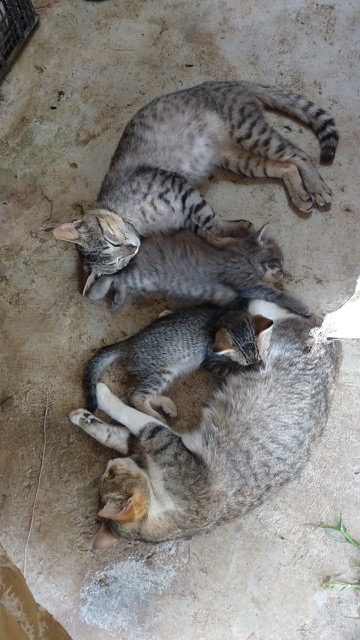
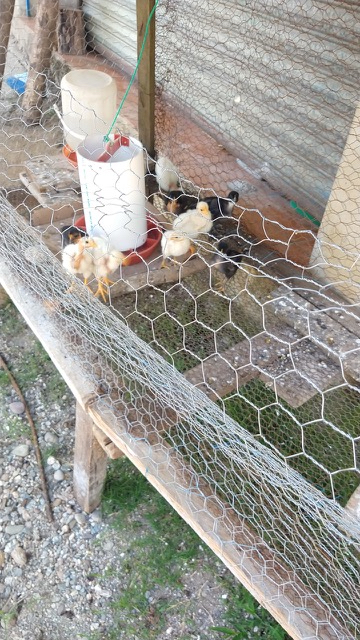
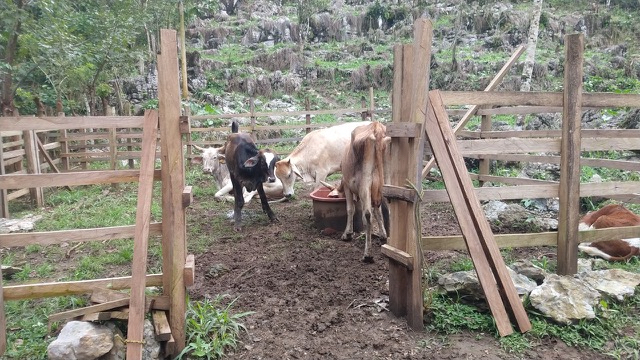
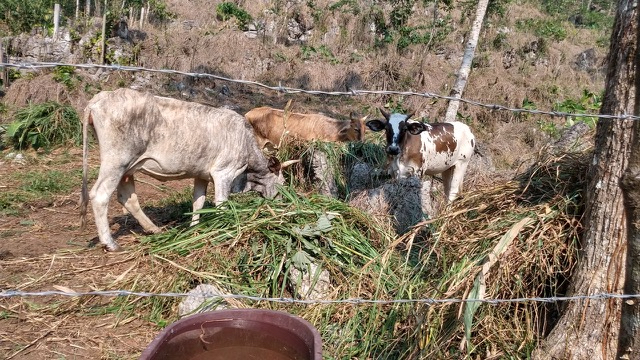
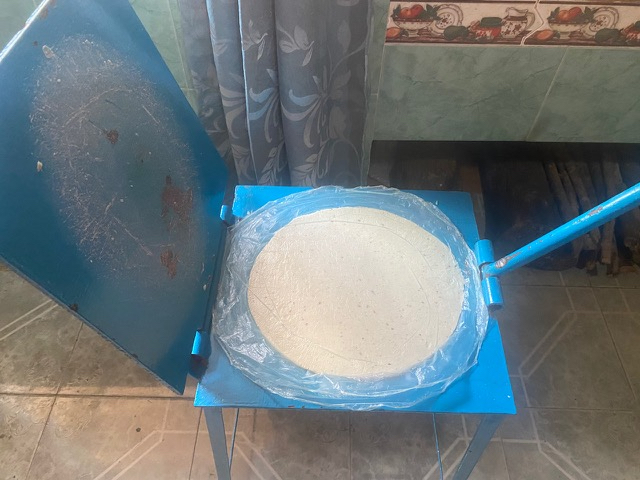
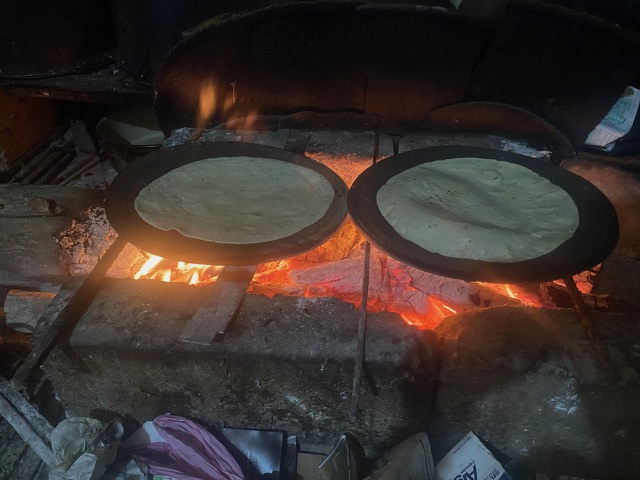
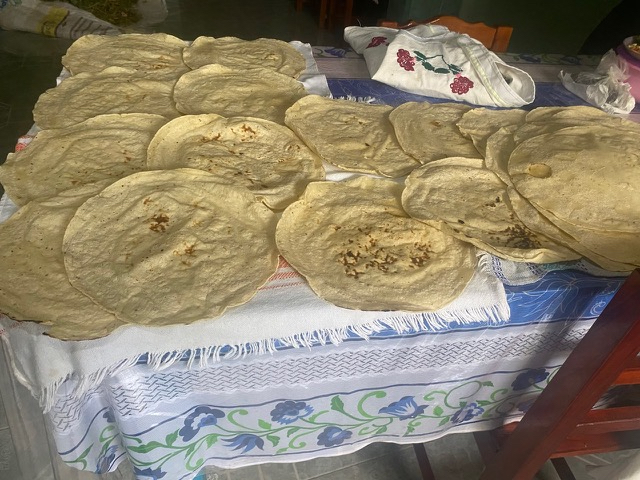
“Hello friend JOHN, good evening, I hope you like these photos. It is from the coffee that I am harvesting.
– Maythe”
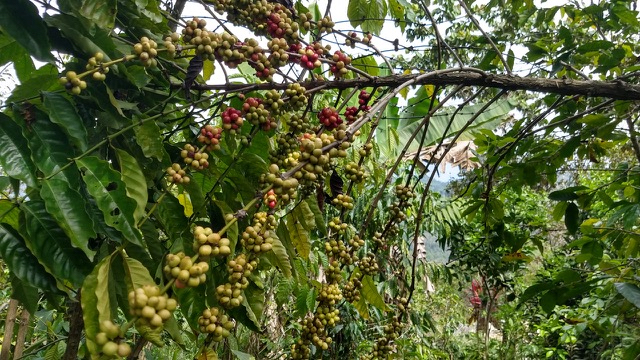
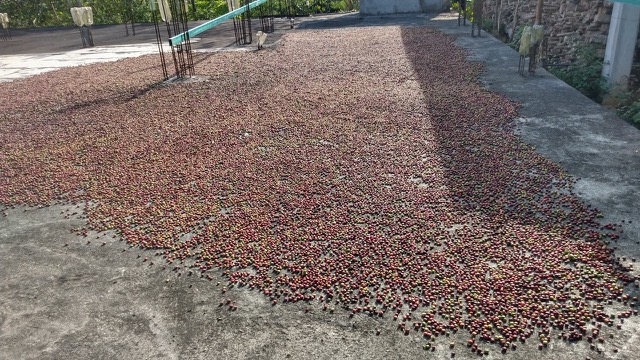
Maythe says it never freezes or snows at her family’s farm. I have been teasing her that all of us will show up at her farm for a week long fiesta this fall—just teasing (I think).
Thanks to All the Other H-2A Workers
Mayra, Antonio, Ruben, Concepcion, Jesus, and Gabriel—you are the best!
Relations
Lots of familial connections amongst our crew.
Mayra and Antonio are cousins.
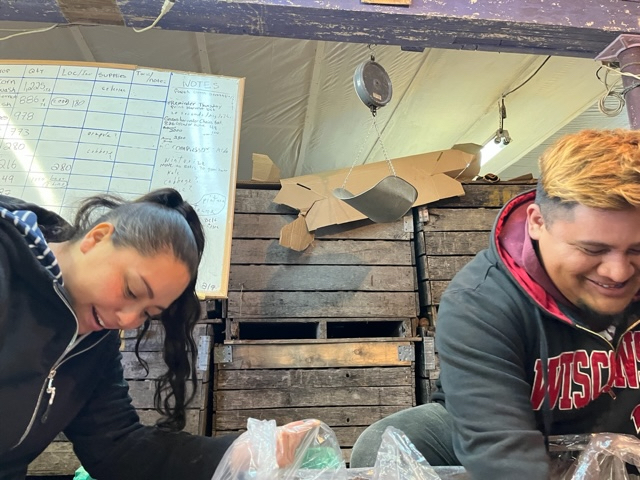
they are friends since childhood
Boni is Antonio’s brother-in-law.
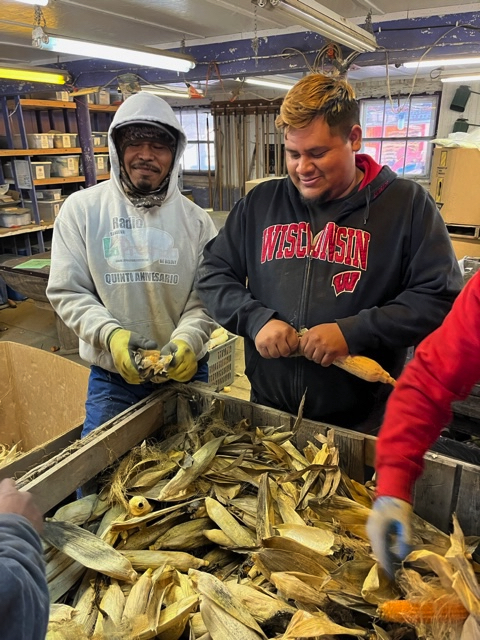
Boni and Antonio grade popcorn
Mayra’s husband Aldo is visiting for a couple weeks and is helping in the fields.
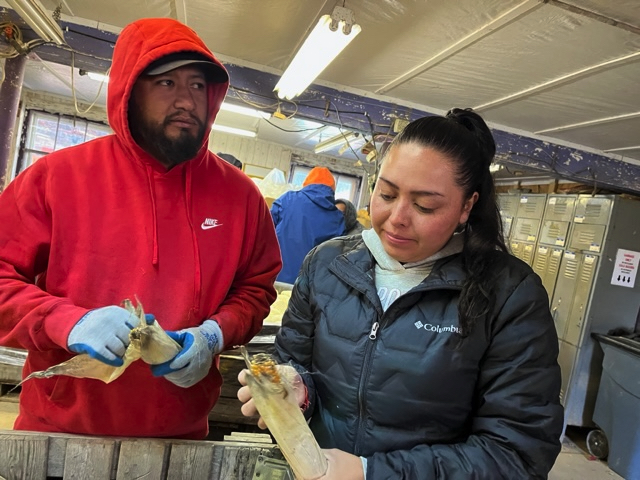
Aldo and Mayra strip back corn husks to provide autumn color to the box
Bartolo and Maythe are from the same part of Oaxaca and, in addition to speaking other languages, they speak the same native language, Chinanteco.
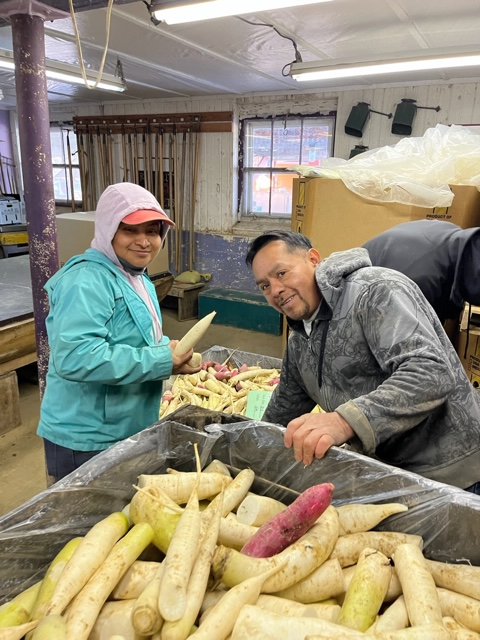
Maythe and Bartolo sort Daikons
Gabriel is Pollo’s brother-in-law.
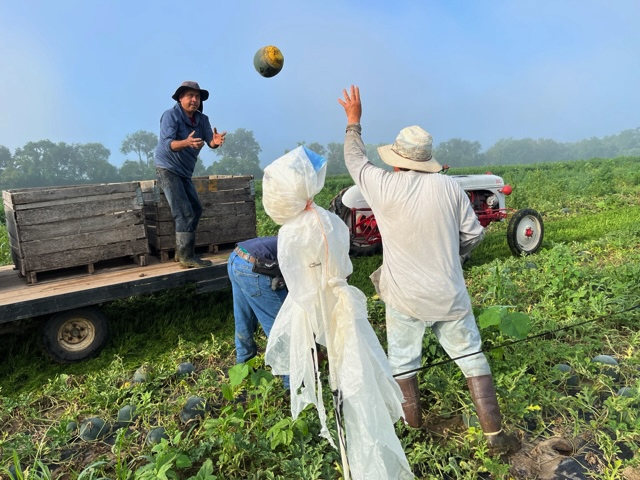
Gabriel catches a melon. The ghost (scarecrow) photobombed Pollo, who is reaching for a melon.
Fun
Not only is our H-2A crew super hard-working, they also invite me to their parties/fiestas, where I feel like I am one of them, and where I remember how much I love Mexico.
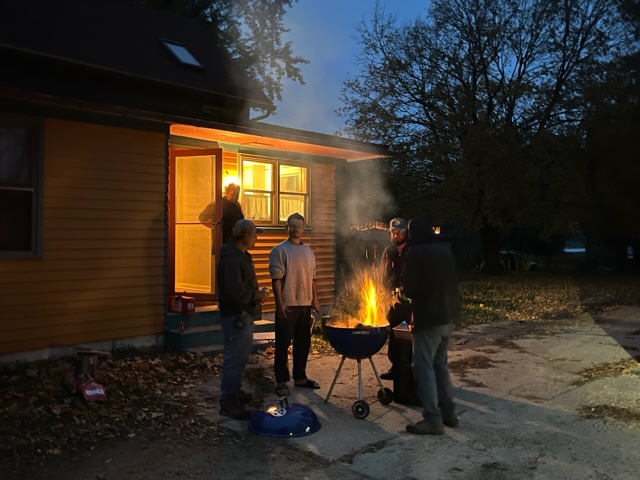
shades of Mexico
There’s More
I can’t leave out other fun, hard-working farmmates: Pollo, here for 23 years; Victor, here for 13 years; Bartolo, here for many years; Zdenek, our truck driver; Nathan, our greenhouse manager, and my wife Haidy. Also, there’s our cheerful pack coordinator Don Glasenapp, and so many wonderful, dedicated, and interesting pack volunteers. Wow!
And to Our Shareholders
Without you, the farm and the food would be only a memory. Without you, there would be no lifeline to Mexico for the H-2A workers and their families, no Farm News, no Field Days, no U-Pick Garden, no weather report, no crop report, no crew report, no vegetables and herbs, and no CSA. Thank you for making all of this possible.
With Much Appreciation,
Farmer John
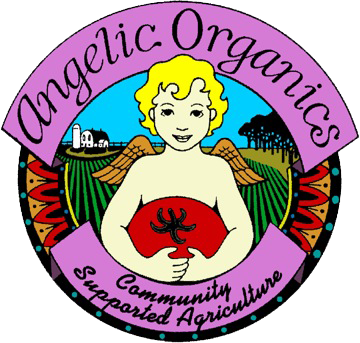
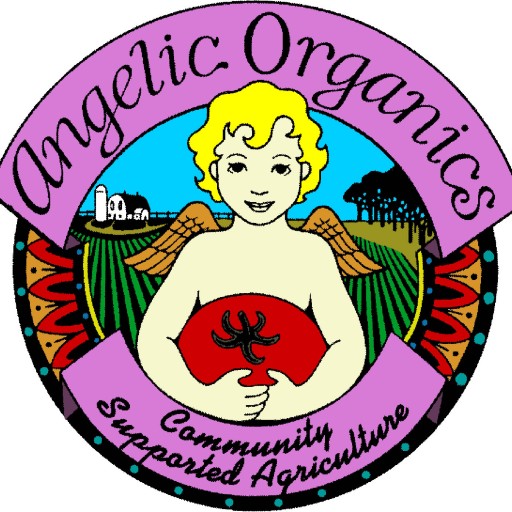
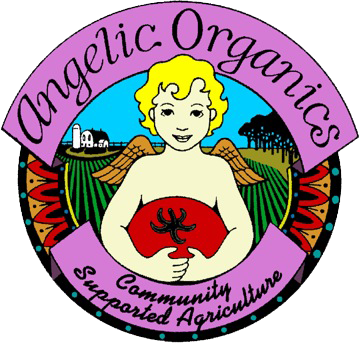
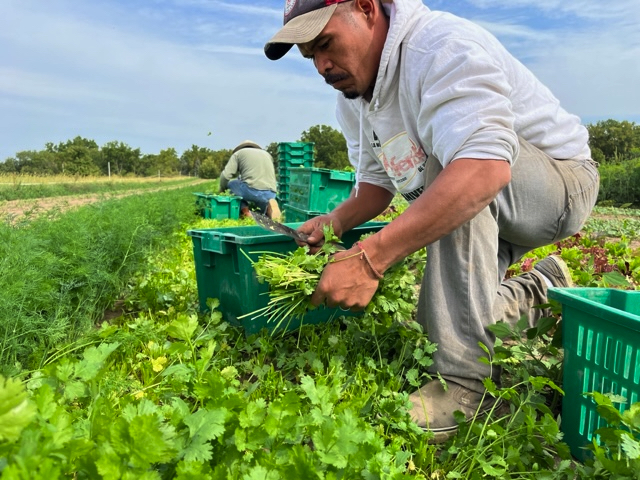

You brought tears to my eyes! Beautiful people!
yes, so beautiful
Please don’t stop writing your stories if you enjoy writing them. I, for one, would miss them a lot. And thank you for spotlighting the farm workers. Their stories are both inspiring and instructive in that they remind me of my own tremendous privilege.
As always, many thanks.
Thank you. Our team and I so appreciate your warm insight and empathy.
My family and I are so grateful for the labor and care of the whole team. I am happy that through the farm the crew can provide for themselves and their families in Mexico. Welcome Boni! I hope this was a good experience and you are able to return. Farmer John, thank YOU for interviewing everyone. We enjoy learning about a bit about each person – feels like a farm family than contributes to the health of the farm and our families.
read to the crew yesterday–much appreciated
Boni lit up with your welcome!
This is the best Farm News I’ve read all season! Thank you for sharing these stories.
beautiful from you Megan
Thank you for wonderful stories and a very wonderful season.
I truly appreciate learning about the great and hard working crew. So glad to be in partnership with these people and I wish them and their families the very best. It is good you take the time to get to know them on a personal basis and then share that information with us. It is a great connection to the land and people for those of us who do not farm for a living.
I read this reply from you to the crew yesterday. Victor translated. Thank you so much.
Thank you. I read your wonderful message to the crew yesterday. They felt the love.